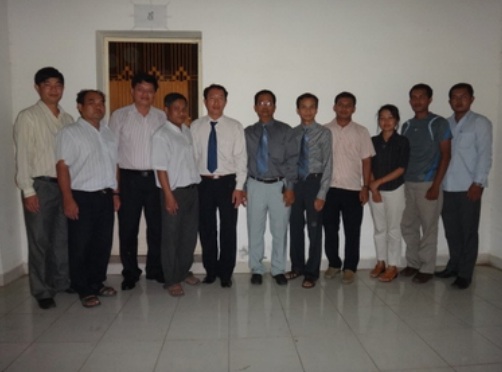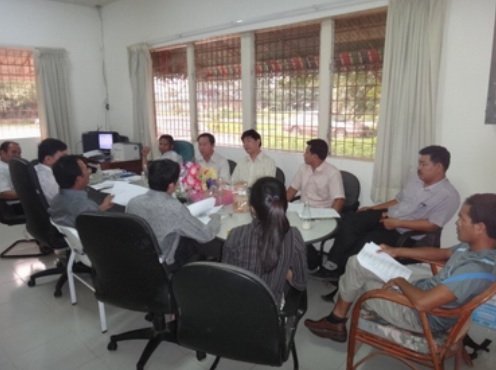Alastair Hicks
Background
The Faculty of Agroindustry at the Royal University of Agriculture in Cambodia was established in 2001 under the policy of the Royal Government of Cambodia to enhance the agro-industry sector in Cambodia and to produce qualified human resources with a BSc course in Agro-industry. This aims to manage agricultural products by reducing their losses and to increase the efficiency of post-production aspects, and also to manage technology in the agro-industry sector and to process the products for markets in country and abroad. In this context, Departments of Food Science and Technology, Food Biotechnology and Post-harvest Technology have been established in the Faculty.
So far, the Faculty has been collaborating with several national and international universities and research institutions in terms of their academic affairs and their research activities. The Faculty has also been working closely with private companies and NGOs to exchange experiences and technologies. Following these collaborations, students have opportunities to gain employment and receive a scholarship to study abroad. By 2009 there were 203 students (151 females) already employed by the Royal Government of Cambodia, by private companies and by local NGOs, and some graduates have studied abroad.
Introduction
A series of meetings have been held in recent years in Cambodia to discuss the formation of a Cambodian Association of Food Science and Technology (CAFST). These meetings were held to discuss the CAFST formation and constitution, with discussions held between the private sector, academics and teachers of food science and technology, and concerned government officials from related ministries.
Timing
These meetings culminated in a formation workshop, held in mid-June 2012 at the Faculty of Agroindustry, Royal University of Agriculture, Cambodia (see http://www.rua.edu.kh/).
Purpose and Scope
To establish a Cambodian Association of Food Science and Technology (CAFST) as a professional association in Cambodia, with a generic constitution in line with the other members of the Federation of Institutes of Food Science and Technology in ASEAN (FIFSTA).
Arrangements
The generic Constitution provided (since 2007) has been translated into the Cambodian language by Mr Kong Thong. The final document and outcome of the 2012 meeting was to be submitted through various Ministry(ies) by the CAFST official(s) to obtain clearance at appropriate levels for CAFST establishment and registration. Once registration of CAFST is completed, this finalises its membership of FIFSTA. This enables CAFST to hold professional technical meetings for members, and also for it to arrange an ASEAN Food Conference in the future. Later CAFST could become an adhering body to the International Union of Food Science and Technology (IUFoST).
Support and Participation
Funding in support of the meeting was provided by Bangkok Exhibition Services (BES) General Manager Justin Pau.


The concerned participants involved in the formation workshops were drawn from academics in the Faculty of Agroindustry, Departments of Food Science and Technology, Food Biotechnology; and Post-harvest Technology at The Royal University of Agriculture.
Executive Committee
As an outcome of these meetings, an Executive committee was formed in September 2012 with the following members:
Mr Kong Thong, President (and Dean, Faculty of Agroindustry)
Mr Em Huy, Vice-President
Mr Ek Sopheap, Finance and Administration
Mr Chuy Kongkruy, Planning and International Cooperation
Dr Buntong Borarin, Research and Development
Mr Chrun Rithy, Human Resources
Ms Ly Visoth, Secretary
Board Members: Pic Chan (Chairman), Dr Mao Soperath, A/Prof. Dr Huon Thaurak, Dr Sor Chedra and A/Prof Kong Thong.
There followed several months of discussions with the Cambodian Ministry of Interior, responding to requests for clarification of objectives, minor modifications to the Constitution, and establishment of a location address for the CAFST office, this being now at the Faculty of Agroindustry, The Royal University of Agriculture, Dongkor District, Phnom Penh, Cambodia, PO.Box 2696. The last meeting to finalise the Constitution was 5 October 2012 and the start of registration was from that date, with CAFST receiving permission from the Ministry of Interior on 5 March 2013.
After clearance of all these matters, visits were made to Phnom Penh City Hall to register CAFST and to request an operating license. By April 2013 (Cambodian New Year) this license was issued and CAFST was registered formally.
The Ministry of Agriculture appears to focus on policy, while the Ministry of Standards, also the Ministry of Commerce’s Department of Agroindustry, focus on quality related to market foodstuffs. Interaction with the Cambodian Chamber of Commerce will be needed, to involve their Associations from the private sector, including the huge multinational Thai CP company; together with the local SME’s in the overall development of the embryo food industry and CAFST.
In May 2013 a Board meeting outlined an action plan, membership drive, and an initial workshop on Food Safety Awareness, for which funding is needed. FIFSTA has welcomed CAFST into its fold at its recent meeting in Bangkok at Propakasia on 13 June 2013. They will await the completion of Cambodia elections in July 2013, and then proceed with activities of CAFST. A progress report on CAFST will be given to the Ministry of Industry and Energy in December 2013/January 2014.
Dr Alastair Hicks is a special envoy for FIFSTA, to enable the five ‘newer’ ASEAN countries to form professional Associations of Food Science and Technology (Vietnam 1999, Brunei 2005, Cambodia 2013, Laos PDR and Myanmar 2013) providing them with a generic constitution based on that of the five ‘older’ ASEAN countries (Indonesia, Malaysia, Philippines, Singapore, Thailand), with 2015 as the goal for all ASEAN countries to be established in FIFSTA, then to become Adhering Bodies of IUFoST. Only Laos PDR has yet to register.
Dr Hicks is Adjunct Professor of Agroindustry, Mae Fah Luang University, Thasud, Muang, Chiang Rai 57100, Thailand, and a Fellow of the International Academy of Food Science and Technology; Email: alastairhicks@gmail.com
IUFoST Scientific Information Bulletin (SIB)
FOOD FRAUD PREVENTION